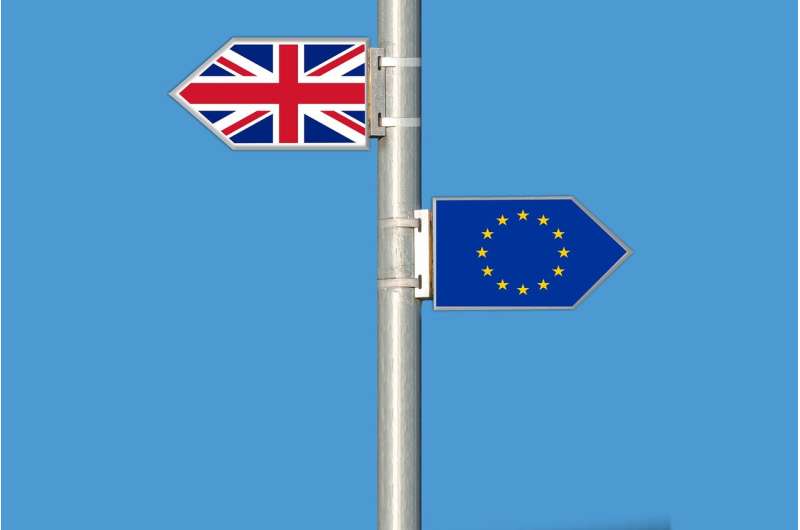
In the Council of the European Union, member states mostly cooperate with other countries in their geographical proximity. However, once it became clear that the United Kingdom was going to leave the EU, the member states also started cooperating to a greater extent with ideologically like-minded members. Research from the University of Gothenburg shows that Brexit may, in part, have changed the logic behind how cooperation in the Council of the European Union is structured.
<section class="article-banner first-banner ads-336x280">
<!-- /4988204/Phys_Story_InText_Box -->
</section>
The Council of the European Union is one of the most important EU decision-makers. Government ministers from the 27 EU member states participate in the Council meetings to negotiate and make decisions on the European Commission’s proposals for EU laws. Which ministers meet depends on the topics to be discussed. It is well-established in the research that member states prefer to cooperate in the Council with their neighboring countries, which has led researchers to interpret these patterns as relatively stable. However, it is only now that researchers are able to explain what underlies this stability.
Political scientist Markus Johansson has researched the consequences of Brexit on EU cooperation. He studied how the cooperation patterns in the Council of the European Union have changed from the period before the British referendum on Brexit in 2016 compared to the period after.
Given that the cooperation patterns are stable over time, he tested a structural explanation for cooperation which assumes that member states with similar economic and political systems at national level also ought to have more similar interests in EU negotiations. In the study, this is tested against an explanatory model of ideological differences between the governing parties of the member states. This is a more volatile factor as the ideological orientations of governments are affected by national elections and potential changes of government.
“The results indicate that member states with more similar economic and political systems also have stronger partnering relationships and that the effect of this is as significant before as after the Brexit referendum. This provides a first indication that these similarities could be an underlying cause of the stability of partnerships between member states over time, and that they follow geographical patterns.”
The ideological differences between the governments were measured on three dimensions: economic left-right, GAL-TAN (green, alternative, libertarian and traditional, authoritarian, nationalist), and attitude to European integration.
“Before the Brexit referendum, none of these ideological dimensions had any effect on relationships between member states. But after the referendum, both the GAL-TAN dimension and attitude to European integration have had an impact on cooperation. Member states that are ideologically similar on these dimensions have cooperated more closely in the period after it became clear that the United Kingdom was going to leave the EU.”
The study does not clarify the cause of the change that has taken place. However, it is clear that the remaining member states have had to adapt their relationships to a new political landscape which no longer includes the United Kingdom.
“With the United Kingdom’s withdrawal process in progress, EU cooperation has also landed in the political spotlight more generally. This could be a contributor to a more ideological logic behind the new relationships that are established when a member state disappears,” says Markus Johansson.
</p><hr/>
<div class="article-main__explore my-4 d-print-none">
<div class="d-flex align-items-center">
<svg>
<use href="https://phys.b-cdn.net/tmpl/v6/img/svg/sprite.svg#plus" x="0" y="0"/>
</svg>
<p class="text-bold mb-0 ml-2">Explore further
</div>
<a class="text-medium text-info mt-2 d-inline-block" href="https://phys.org/news/2020-01-brexit-referendum-radical-euroskepticism.html">Study: Brexit referendum did not lead to more radical Euroskepticism elsewhere</a>
</div>
<hr class="mb-4"/>
<div class="d-inline-block text-medium my-4">
Provided by
<a href="https://phys.org/partners/university-of-gothenburg/">University of Gothenburg</a>
<a class="icon_open" href="https://www.gu.se/english/" target="_blank" rel="nofollow noopener">
<svg>
<use href="https://phys.b-cdn.net/tmpl/v6/img/svg/sprite.svg#icon_open" x="0" y="0"/>
</svg>
</a>
</div>
<!-- print only -->
<div class="d-none d-print-block" readability="15">
<strong>Citation</strong>:
After Brexit: Outcomes on cooperation in the Council of the European Union (2021, April 27)
retrieved 27 April 2021
from https://phys.org/news/2021-04-brexit-outcomes-cooperation-council-european.html
This document is subject to copyright. Apart from any fair dealing for the purpose of private study or research, no
part may be reproduced without the written permission. The content is provided for information purposes only.
</div>






